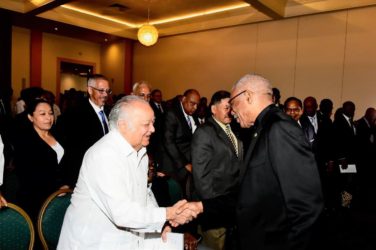The heads of Guyana’s foreign missions were yesterday urged to vigorously pursue the country’s national interests, including the protection of the rights of citizens in the diaspora when a five-day summit to improve the country’s diplomacy opened.
The Heads of Mission Conference, which is the second of its kind to be organised by the Ministry of Foreign Affairs, opened at the Pegasus Hotel yesterday under the theme ‘Advancing Guyana’s Diplomacy in the 21st Century.’
According to Foreign Affairs Minister Carl Greenidge, given the fact that the administration is new and so many of the diplomatic appointees are new to international diplomacy and the ministry itself, it was felt that it was important to convene such a forum, which would see the heads familiarising themselves with the diplomacy of the government and taking counsel on the measures to be taken to improve the country’s foreign policy.

President David Granger (right) greeting veteran Guyanese diplomat and former Minister of Foreign Affairs, Sir Shridath Ramphal (Ministry of the Presidency photo)
He pointed out that the ministry’s current mandate is not one that it can pursue by itself nor is it one that its overseas representatives can conduct without reference to other agencies in Guyana.
Further, he said that the foreign policy is but an extension of Guyana’s national policy and, therefore, the representatives must understand their roles and responsibilities as it relates to the country’s national development, hence the ongoing forum.
Greenidge noted that these are interesting and complex times as deep-seated and complex changes have occurred internationally and pose challenges, especially for small developing states such as Guyana. As a result, he said that smaller states need to seek to navigate their transformation without jeprodising either their territorial integrity or their sovereignty and more specifically they need to ensure their survival and achieve progress.
Successful foreign policies, he pointed out, cannot be left to fortune as if one’s policy is to be effective in the challenging circumstances, there is need enlist extensive and intensive knowledge as well as skillful management.
He said discussions of the issues that form part of the forum’s agenda need to yield positive and practical actions, which can guide the country’s diplomats.
He mentioned the ongoing border controversy between Guyana and Venezuela and United Nations (UN) Secretary-General Antonio Guterres’ appointment of Dag Halvor Nylander, a Norwegian diplomat, to mediate.
As a result of Venezuela’s renewed efforts to claim Guyana’s territory, former UN Secretary-General Ban Ki-moon, before he demitted office, announced a limited term of one more year for the Good Office’s process to continue, following which, if no progress is made, then the International Court of Justice (ICJ) would be the next means of settlement.
In this regard, Greenidge said, Guyanese diplomats are to ensure that every channel of communication remains open and active with the representative of the Secretary General while preparing for the eventual and possible solution of the border controversy at the ICJ.
For Guyana, the minister said the border controversy does not stand alone as there is also another controversy with Suriname. As a result, he noted that Guyana is the only country in the hemisphere whose border controversies pose a threat to its very existence as a state.
“That is why we cannot afford to be confused by those, who with the best of intentions, urge [us] to go softly in our reactions to challenges…,” the minister said.
Meanwhile, in his address, President David Granger noted that small states must pursue their national interests through the practice of diplomacy in the international system.
Granger said Guyana has an obligation to extend its protection to every citizen, whose rights are important wherever they are.
He added that the protection and projection of Guyana’s sovereignty are essential elements of Guyana’s diplomacy as he pointed out that Guyana lacks both the economic strength to sanction other states and the military capability to extend its power beyond the country’s border. He said the country has no desire to do either of these things but pointed out that a small state, notwithstanding its limitations, can seek influence in relations in order to achieve its foreign policy objectives.
Director General of the Foreign Ministry Audrey Waddell noted that Guyana is at an exciting and challenging juncture of its development as the next year, in particular, will have significant implications for the country’s aspirations for the creation a stronger, modern and prosperous state.
She noted that the imperatives of the country’s foreign policy have not changed over the years as the preservation of sovereignty and territorial integrity, security against external threats and pursuit of economic prosperity remain central.
But while the imperatives of the foreign policy have not changed, Waddell cautioned that there is still need to be mindful of changes that have occurred and noted that ongoing forum is an opportunity by mission heads to collectively review their responsibilities in order for them to achieve the country’s foreign policy objectives.
“Equally, it allows for high-level strategising on how to advance [diplomacy] in the 21st century in accordance with our theme,” the Director General said.
Last year, she said, the ministry made a number of strides in achieving the core foreign policy objectives of enhancing the strength, reach and efficacy of the country’s diplomacy. To this end, she pointed out that a mission was established in Geneva, the consulate in Trinidad & Tobago was upgraded to a full-fledged diplomatic mission and the ministry is continuing to consolidate traditional relationships while reaching out to for new alliances.
Importantly, Waddell said that the ministry is called upon to look at the interests of Guyanese at home as well as abroad since it remains “deeply conscious” of the importance of the diaspora to the country’s national development.




